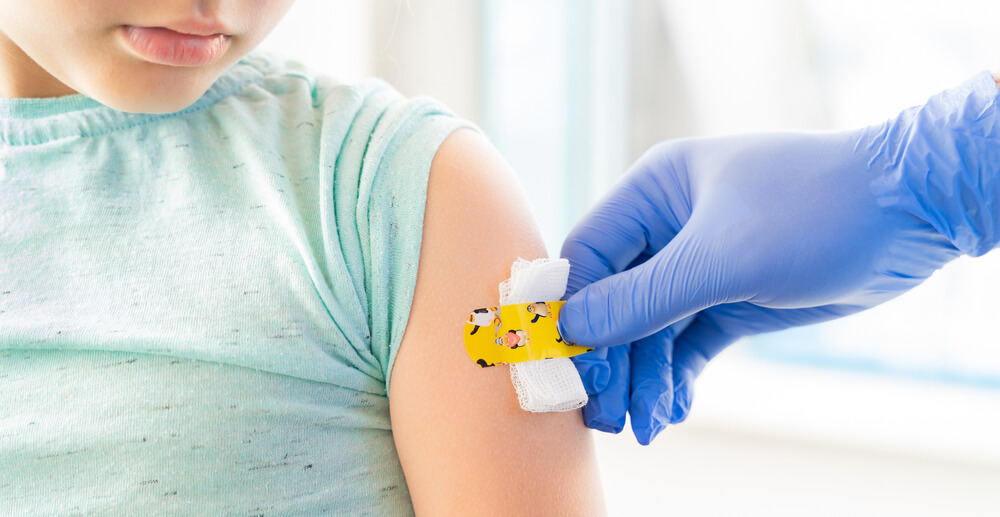While school is a normal part of children’s lives, where they grow, learn, and socialize, it’s also a place where germs and viruses can spread rather easily. The stronger their immune system is and the better their hygiene habits, the more effective it is to keep kids healthy at school. This is precisely why it’s essential to introduce proper practices into their daily routines, such as handwashing, balanced eating, a regular sleep schedule, and more. Keeping kids healthy in school is mainly affected by children’s behavior, which is why parents have to teach them about it. If you, as a parent, worry about your children’s health in any way, don’t hesitate to make an appointment at the Pediatric Endocrine and Metabolic Center of Florida. That said, we’ll now share some of the best health tips for kids while in school.
Get All the Needed Vaccines
The pandemic caused a dramatic decline in the proportion of children who received all of their recommended immunizations by the recommended age. Vaccines against COVID-19 can now be given to children as young as six months. To keep kids healthy, make an appointment with your child’s doctor to vaccinate them against COVID-19 and any other necessary diseases, such as the seasonal flu. No one in your household should be without it by the month of October. Those who have received all necessary vaccinations are at a considerably lower risk of becoming infected with and/or spreading the disease.

Handwashing Is a Must
One of the most important things kids can do to stop the spread of germs in their classroom and elsewhere is to wash their hands with soap and water for 20 seconds. The common habits of children, such as rubbing their eyes or scratching their noses after coming into contact with germs, make them especially vulnerable to infection.
The rest won’t be too far after if one family member gets sick. However, if you wash your hands frequently and teach your kids to do so as well, you can reduce the potential spread of germs and improve children’s health in general.
Make sure kids know when and how to wash their hands correctly (after nose blowing, going to the bathroom before it’s time to eat, etc.). They are less likely to become ill themselves and spread the illness to others when keeping healthy like this.
Keeping Healthy with Strong Immunity
Although there is no foolproof way to improve the immune system as tried and true health tips for kids, children must maintain physical health to ensure that their immune systems function normally. Your kid will be less likely to catch a cold or the flu if you highlight the importance of a good night’s sleep, a balanced diet, stress reduction, physical activity, socialization and humor, and frequent handwashing.
Vaccination is the best way to keep kids healthy and protected. The supplement market for children is also increasing, and more and more parents are looking into vitamins and minerals like elderberry or vitamin C as an aid for keeping kids healthy in school.
However, the American Academy of Pediatrics does not recommend vitamin supplements for kids who are otherwise healthy and eating a balanced diet. Vitamins should ideally be obtained through food sources. If you believe that your children’s health will benefit from vitamins and supplements, make sure to discuss this with their doctor first.
As their immune systems mature, most children will catch about six colds each year, regardless of how well they’re keeping healthy.
Keep Stress and Anxiety at Bay
There are many sources of stress that children and teenagers encounter on a daily basis. Anxiety and stress can negatively affect children’s health in the same ways they do adults. It’s important for parents to recognize the signs of stress in their children and work to alleviate their worries.
This is particularly crucial when your kid prepares for a new school year. Some children may continue to display signs of distress as they work through the difficulties they encountered as a result of the pandemic.
Think about ways to relieve stress as a family. Help your child realize that they have a say in some aspects of their lives, such as how they dress and use their leisure time. This could entail anything from playing games or going for a stroll to keeping a journal for some kids. After all, a lot of work in terms of keeping kids healthy in school starts at home.
It’s crucial to tailor tactics for dealing with stress to each individual. What benefits one child may not benefit another. If your kid’s worry and stress persist despite your best efforts, it may be time to consult with a pediatrician.
Proper Sleep Is Crucial
Getting enough sleep is essential for maintaining your children’s health, both in school and outside of it. As a matter of fact, research shows that sleep deprivation can have a wide range of negative consequences for children. A lack of sleep can impair one’s ability to focus, contribute to weight gain, melancholy, suicidal thoughts, and even make them more prone to injuries.
A child’s performance in school can be affected by how well they sleep, not to mention that sleep is vital for their physical and mental health. In addition, studies show that today’s youth get less sleep than previous generations.
Breakfast Can Make a Difference
If you’re interested in the best health tips for kids, you simply cannot ignore the importance of a good breakfast. Regarding academic performance, breakfast is the most crucial meal of the day. It’s well-established that starting the day with a protein- and complex carbohydrate-rich breakfast helps with cognitive performance and keeps energy levels consistent.
Children who eat breakfast frequently ingest more nutrients and less fat and cholesterol. Kids who eat breakfast have 20% to 60% more iron and vitamins B and D than those who don’t.

Provide Healthy Snack Choices
Convenience doesn’t have to come at the expense of healthy eating. After-school snacks that are both healthy and quick to prepare can be just as satisfying as those that are processed.
When combined with balanced meals, healthy snacks can fill in any nutritional gaps that could otherwise exist in a child’s diet. In addition, teaching kids to eat in moderation and only when they’re hungry by providing tiny snacks in between meals encourages the formation of beneficial eating routines.
In spite of our best efforts, our children are constantly exposed to germs. This is especially the case when they interact with other children, such as in a classroom, on a playground, or during a sporting event. However, the above-mentioned health tips can significantly reduce the risk of getting sick, both in school and everywhere else. Of course, it’s essential that a child has a trustworthy pediatrician, so feel free to get in touch with us at the Pediatric Endocrine and Metabolic Center of Florida (PEMC) if you want the best from these pediatric services.


